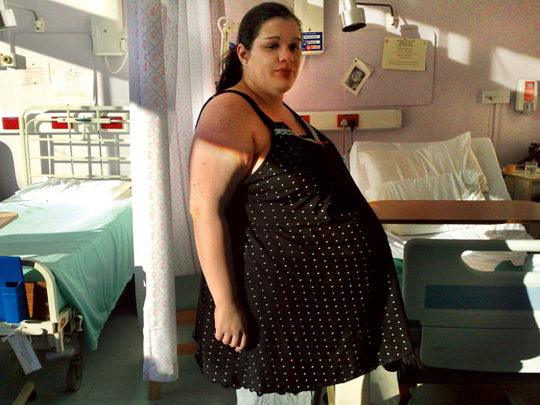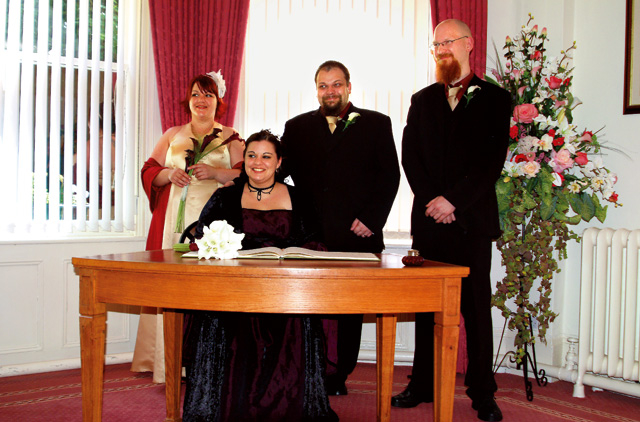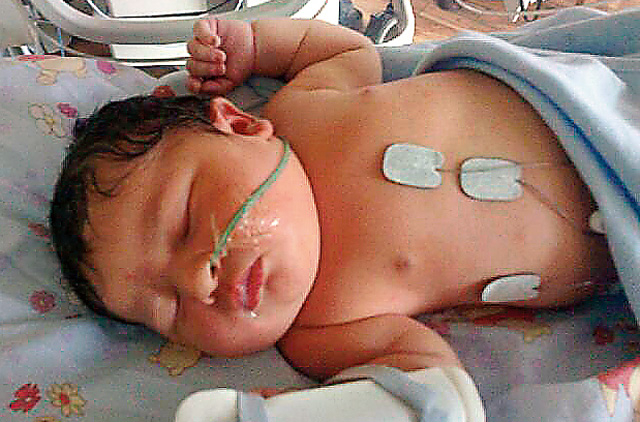
Sitting on the side of the bath, I stared at the home pregnancy kit. "Please be positive," I willed. I'd wanted a baby for as long as I could remember, and now, watching the second line appear in the test window, I grinned. I would have jumped up and down for joy but I felt too nauseus. Nothing could quell my excitement though - I was 20 and was going to be a mother.
I'd been feeling off-colour for a few days, and couldn't drink my usual 13 cups of tea a day. My appetite had vanished too, and now I knew the reason why. Grabbing my handbag, I went straight to the nearest baby shop and bought a pair of booties. When my fiancé Kris, 26, came in from working as a web developer, I handed them to him.
"What's this?" he said, looking confused.
"You're going to be a daddy," I grinned.
We didn't tell anyone - it was our delicious secret. But a couple of days later I started bleeding. Doctors at the hospital confirmed I'd lost the baby. We were both devastated, but it made me even more determined to be a mother.
Every month I'd buy two pregnancy tests to try the day I was due, but each time they were negative. Then my menstruation became irregular. My face broke out in spots. I looked as much of a mess as I felt. I'd always been on the bigger size but now my weight ballooned to a size 22, which at 163cm (5ft 4in), was uncomfortable. My hormones were all over the place and I noticed thick, black hairs sprouting on my chin.
"What's happening to me?" I sighed, depressed. We'd been trying to have a baby for over a year now, so I went to my GP.
She sent me for scans at Neville Hall hospital in Abergavenny, Monmouth, Wales. Staring at the monitor, I could see two massive clusters of cysts on my left ovary and a few on my right.
I was diagnosed with Polycystic ovary syndrome (PCOS). I was relieved that there was a reason why I couldn't conceive. But there was no cure, only treatment to alleviate the symptoms. I was given drugs to stop the cysts forming and to regulate my periods.
"You need to lose weight," doctors told me. I knew that, but I'd tried every diet going and had never lost more than half a stone.
But I was desperate to become pregnant. My heart as well as my arms longed for a baby.Everywhere I looked I'd see pregnant women or new mums pushing prams.
"That'll be me one day," I vowed. But how long would it take? I was scared of becoming bitter and jealous.
Every day I took my medicine, and planned our wedding. It took my mind off my despair when my period came every month.
I needed to diet to become a mum
I knew without losing weight I'd never be a mum. "Why don't you try Dietcare?" Kris's mother Jill suggested one day.
She'd lost a lot of weight and had said how easy it was. So I looked on their website and saw there was a special diet for women with PCOS. "It's a fertility diet," I said, excited.
At £22 (Dh126) a month it wasn't expensive, and they'd tailor a diet for my exact needs and tastes. Most of it was common sense - it was low in carbs, high in protein, fruit and veg.
But the innovative part of the diet was "The Burns" which meant that I had to eat every 15 minutes. The bite-size nibbles of vegetables, like carrots, would speed up my metabolism and burn off the fat. It worked for women with PCOS because research showed they had a slower metabolism than non-sufferers.
"What do I have to lose?" I thought. "Except weight!" I vowed to stick to the plan, no matter how hard. This wasn't about getting into a pair of skinny jeans. Losing weight would help me get the one thing I wanted most in the world - a baby.
Forcing myself to remember to eat my carrot cube every 15 minutes was tricky at first. I spent the entire first day clock-watching, but I didn't feel hungry once.
"This is easy," I told Kris, tucking into chicken cooked in its own juices with vegetables. I lost 6.3kg (1 stone) the first week.
I made friends with other women on the fertility diet forum online. It was good talking to women with PCOS who knew exactly what I was going through. And when one of them announced they were pregnant after years of trying, we all celebrated. If she could do it, then so could we.
I was seeing results
Within six months I lost 22.2kg (3.5 stones) and my spots cleared up. The hair on my face seemed thinner too. I didn't feel as tired, or depressed. And then one day, I was drinking a cup of tea when I pulled a face. "Is this milk off?" I muttered. Then I gasped. The last time I'd hated the taste of tea I'd been pregnant.
Trying not to get my hopes up, I rushed to do a test. My hands were shaking as I unwrapped it. The blue positive line appeared straight away. I was pregnant at last.
I burst into tears, I was so happy. After five years of trying I was finally having a baby - thanks to the fertility diet.
Excited, I rang Kris. "I did a test" I cried down the phone. "It's positive." He didn't burst into tears like me, but I could hear the excitement in his voice. We were both nervous too, and didn't tell anyone. We didn't want to tempt fate. But this pregnancy felt different. I was sick all the time, and had a bump almost immediately.
We went for a scan at eight weeks. "There's the heartbeat," the sonographer smiled, pointing to a flashing dot in the middle of the monitor. "Hello baby," I whispered, feeling overwhelmed. I kept it secret until after our wedding, which we'd already arranged, and 12-week scan. My family and friends were excited.
My pregnancy was exactly what I imagined. I was sick all the time, had backache and every niggle going, but I didn't care. I was just so glad to be expecting a baby.
I ballooned, and could hardly move as my due date approached. I didn't really make a birth plan, which was lucky as I was induced after my due date came and went. When I failed to dilate more than 3cm, the midwife broke my waters. Kris held my hand as I sucked in lungfuls of gas and air, then begged for an epidural after the contractions became too painful.
Finally after hours in labour, I was taken to theatre for a Caesarean, as the baby's heart-rate was dipping. Ben was a big baby, 4.76kg (10lb 8oz), and needed oxygen. "Will he be OK?" I asked, scared, as he was whisked away to the baby unit. Everyone reassured me he would be fine, and after I was stitched up I was taken to see him.
"He's gorgeous," I said, clutching Kris's hand as we stared through the incubator at our beautiful chubby son. But he had low potassium levels, jaundice and an infection so I expressed breast milk into tiny syringes to feed him.
After a week, he was well enough to come home. "Hello beautiful," I said, cradling him. He slept through right from the start, and was the happiest little baby. He's a year now, and never stops smiling. Being a mother is everything I ever wanted and more. When I go into Ben's room in the morning and his face lights up at seeing me, it makes me melt.
I'm going back on the fertility diet as we've decided to try for another baby. One baby was a miracle so having two would make me doubly proud. I'm just grateful to be a mum at last - thanks to a few thousand cubes of carrot.
Rachel's fertility diet
Before
- Breakfast cup of tea
- 10am snack toast and packet of crisps
- Lunch would forget to have it or pasta in creamy sauce
- Dinner roast dinner with Yorkshire pudding
- Drinks 13 cups of tea
After
- Breakfast apple/pear or oranges with yogurt
- Snacks carrot snacks every 15 minutes after breakfast
- 11am snack 2.5cm square chunk of hard cheese
- Lunch Two Ryvita or slimming bread with cottage cheese and salad OR small baked potato with tuna or small piece of cheese
- 4pm snack fruit
- Dinner chicken or meat cooked in own juices plus vegetables and boiled eggs OR omelette OR scrambled eggs
- Drinks water
PCOS in the UAE
Between 5 and 10 per cent of women worldwide suffer from Polycystic ovary syndrome (PCOS), which can affect women from adolescence to perimenopause. PCOS is on the rise in the UAE, due to the high prevalence of obesity among the female population, says specialist obstetrician and gynecologist at Welcare Hospital, Dr Jennifer Kasirsky.
"Each case of PCOS is different and each woman needs an individualised nutrition plan," adds Alice Mohan, manager preventive health and nutrition, RAK Hospital, Ras Al Khaimah.
To help with PCOS, diets should be anti- inflammatory, or low glycemic or low carbohydrate. An inflammation-free diet is important because inflammation in the body tends to increase insulin resistance. On the other hand, food with low-glycemic index takes a long time to process and does not release sugar in to the blood quickly thereby keeping the sugar levels within a normal range. The low-carb diet focuses on lowering calorie intake, which helps reduce body weight, vital to increase chances of conception.













